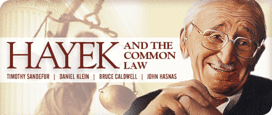Bruce Caldwell’s recent posting prompts me to partially retract one of my earlier comments. Bruce points out the unfairness of my characterization of Hayek as a bad moral philosopher. He is correct in this criticism, although perhaps not for the reason he has given.
Bruce states that Hayek never thought of himself as doing moral philosophy, suggesting that it would be unfair to criticize him for doing it badly. There is some truth in this, but I think that the thrust of one of Sandefur’s attacks on Hayek was that his argument for spontaneous rather than constructed order relied on an implicit, undefended, and internally inconsistent commitment to the normative value of liberty. I believe Sandefur is correct about this, and because Hayek was arguing for normative conclusions without recognizing when he was crossing the is-ought barrier, I characterized him as a bad moral philosopher.
However, there is another sense in which this characterization may be genuinely unfair. As Bruce points out, Hayek was not a foundationalist. I should probably not own up to this in a public forum, but I have often sent some of my postmodernist colleagues unattributed quotations from Hayek, with which they expressed enthusiastic agreement, merely to be able to needle them later when I revealed that it was Hayek with whom they were agreeing. Now, I am not personally a postmodernist. I do not believe that it is “turtles all the way down,” to use the contemporary idiom. My basic position is a deontological one, and I think there are some moral fixed points. Sandefur’s comments led me to believe that he shares this approach. This may lead both Sandefur and I to disagree with Hayek’s non-foundationalist, postmodern approach to ethics, but it would be unfair to characterize him as a bad moral philosopher for holding it. Doing so would be to diss not only Hayek, but postmodernism as a school of thought. If Hayek is indeed a bad moral philosopher, it is not because of his postmodernism, but because of his lack of perception regarding the underpinnings of his own arguments.
I hope it is clear from my earlier remarks that criticizing Hayek for being a poor moral philosopher, legal historian, or jurisprudential thinker is hardly criticism at all. It is unfair to expect him to have been a Renaissance man. His contributions in his field of expertise, economics, completely overshadow any overreaching in the fields in which he was, by his own admission, an amateur.

